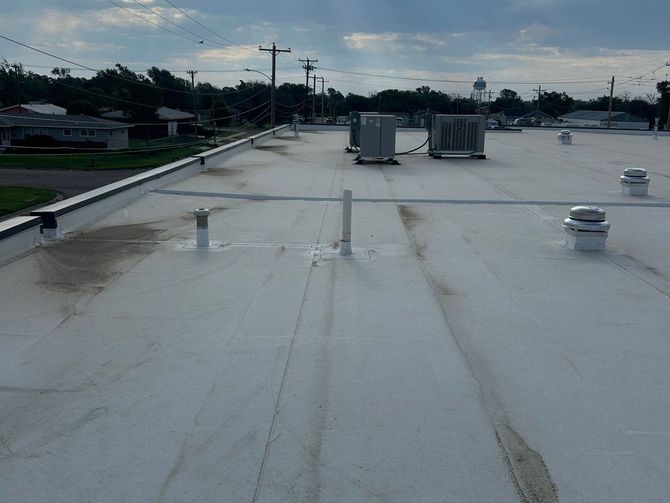Selecting the right industrial roofing system is key to protecting your property and ensuring long-term durability. Whether installing a new roof or maintaining an existing one, knowing your options and their benefits can save you time, money, and stress. Here’s what you need to know about industrial roofing.
Key Considerations for Industrial Roofing Projects
Because industrial roofing projects are complex, understanding the unique requirements of your property is essential. Here are the key factors to consider:
- Building Use: Different industrial buildings may have varying needs, such as heat resistance, weather durability, or soundproofing. Understanding your building’s purpose helps select the right roofing system.
- Environmental Conditions: Different weather conditions, like extreme heat, heavy rainfall, or snow, can influence the durability of your roofing system. Choose materials suited to your area’s environment.
- Budget: Industrial roofing can be a significant investment. Balancing quality with cost-effective options ensures you get the best value for your investment.
- Energy Efficiency: Energy-efficient roofing materials can reduce your long-term energy bills. Look for options that enhance insulation and reduce heating and cooling needs.
Popular Industrial Roof Types: Built-Up, Metal, and Modified Bitumen
Industrial buildings often use specific roofing systems. Below are some of the most common types that provide advantages based on the structure's needs.
Built-Up Roofs (BUR)
Built-up roofing systems are made of multiple layers of materials, typically tar and gravel, providing excellent waterproofing. BUR is durable, offers good insulation, and can handle harsh weather conditions, making it ideal for large industrial buildings. However, the installation process can be lengthy and labor-intensive.
Metal Roofs
Metal roofing is a popular choice for industrial buildings due to its durability and low maintenance. It’s highly resistant to extreme weather, including heavy snow, rain, and strong winds. Metal roofs are also energy-efficient, as they reflect sunlight, reducing cooling costs. They come in a variety of materials, including steel, aluminum, and copper, to suit different needs.
Modified Bitumen Roofs
Modified bitumen roofing combines asphalt with rubber or plastic polymers, offering flexibility and durability. It’s especially well-suited for low-slope industrial buildings and can be installed with heat or cold processes. Modified bitumen is highly resistant to leaks and offers long-lasting protection, making it a reliable choice for industrial roofs.
How to Maintain Your Industrial Roof and Avoid Costly Repairs
Routine maintenance is vital to ensuring your industrial roof lasts longer and avoids expensive repairs. Here’s how to maintain your roof effectively:
- Regular Inspections: Regular inspections by professionals can help detect early issues like cracks, leaks, or debris accumulation before they turn into major problems.
- Clean Gutters and Drains: Ensure gutters and drains are clear of debris to prevent water buildup, which can lead to roof damage.
- Prompt Repairs: Promptly repairing minor issues helps prevent bigger, more expensive problems from developing.
- Coating and Sealing: Protective coatings and sealants can prevent moisture and UV damage, helping to extend the roof's life.
The Importance of Hiring a Specialized Roofing Contractor
Industrial roofing projects are complex and require specialized knowledge and skills. Hiring a contractor with experience in industrial roofing ensures that your roof is installed correctly and maintained properly. A specialized contractor can help you choose the right materials, manage the installation process, and provide ongoing support to keep your roof in optimal condition. Don’t compromise on quality—work with an expert who understands the unique needs of industrial roofing.
Conclusion: Choosing the Right Roofing for Your Business
Selecting the right industrial roof is key to safeguarding your property and ensuring it lasts long-term. Understanding your options—BUR, metal, or modified bitumen—will guide your decision. With a specialized contractor, you can ensure optimal installation and maintenance for years of protection.
Need help with your industrial roofing project? Contact us today for expert advice and a tailored solution to meet your needs!

#IndustrialRoofing #CommercialRoofing #RoofInstallation #BuiltUpRoof #MetalRoofing #ModifiedBitumen #RoofMaintenance #EnergyEfficientRoofing